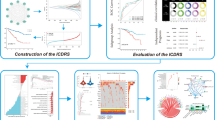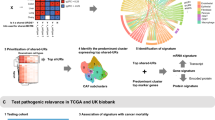Abstract
Senescent B cells exhibit reduced antibody production and enhanced proinflammatory cytokine and chemokine secretion, exerting non-negligible functions in antitumor immunity. This study aims to clarify the prognosis value of B cell senescence–related genes in bladder cancer (BLCA). Twelve B cell senescence–related genes were identified based on previous studies and the single-cell RNA sequencing of a BLCA sample from Gene Expression Omnibus (GEO). The Cancer Genome Atlas BLCA cohort was used as the training dataset. Three cohorts from GEO, 35 clinical samples from the local hospital, and in vitro cell experiments were used for validation. The unsupervised clustering based on the 12 genes was associated with the prognosis and the tumor immunity. Through least absolute shrinkage and selection operator regression and random forest algorithm, G protein subunit gamma 11 (GNG11) and inhibitor of DNA binding 1 (ID1) of the 12 genes were determined as significant prognosis predictors and then included in the multivariate Cox regression model. The model was a reliable and robust prognosis biomarker across multiple large-scale cohorts (pooled HR = 1.76, 95% CI = 1.41–2.20). The tight association between the model and BLCA malignant degree was demonstrated in the local cohort (P < 0.01). The model could also predict the immunotherapeutic sensitivity, which was confirmed by the tumor immune dysfunction and exclusion algorithm (P < 0.0001) and IMvigor210 cohort (P < 0.0001). At last, in vitro cell experiments in IM-9 and GM12878 B cells indicated that GNG11 and ID1 were involved in the cellular aging process. Collectively, a B cell senescence–related gene signature was constructed to evaluate the prognosis and immunotherapeutic response in BLCA, providing novel insights into the biological mechanisms.









Similar content being viewed by others
Data availability
All the data we used could be obtained on the website links provided in this paper. The R code is available in Supplementary File 3.
References
Anderson NM, Simon MC (2020) The tumor microenvironment. Curr Biol 30:R921–R925. https://doi.org/10.1016/j.cub.2020.06.081
Apolo AB, Infante JR, Balmanoukian A, Patel MR, Wang D, Kelly K, Mega AE, Britten CD, Ravaud A, Mita AC, Safran H, Stinchcombe TE, Srdanov M, Gelb AB, Schlichting M, Chin K, Gulley JL (2017) Avelumab, an anti-programmed death-ligand 1 antibody, in patients with refractory metastatic urothelial carcinoma: results from a multicenter, phase Ib study. J Clin Oncol 35:2117–2124. https://doi.org/10.1200/JCO.2016.71.6795
Balar AV, Castellano D, O’Donnell PH, Grivas P, Vuky J, Powles T, Plimack ER, Hahn NM, de Wit R, Pang L, Savage MJ, Perini RF, Keefe SM, Bajorin D, Bellmunt J (2017) First-line pembrolizumab in cisplatin-ineligible patients with locally advanced and unresectable or metastatic urothelial cancer (KEYNOTE-052): a multicentre, single-arm, phase 2 study. Lancet Oncol 18:1483–1492. https://doi.org/10.1016/S1470-2045(17)30616-2
Braun DA, Burke KP, Van Allen EM (2016) Genomic approaches to understanding response and resistance to immunotherapy. Clin Cancer Res 22:5642–5650. https://doi.org/10.1158/1078-0432.CCR-16-0066
Chen K, Huang B, Yan S, Xu S, Li K, Zhang K, Wang Q, Zhuang Z, Wei L, Zhang Y, Liu M, Lian H, Zhong C (2020) Two machine learning methods identify a metastasis-related prognostic model that predicts overall survival in medulloblastoma patients. Aging Albany NY 12:21481–21503. https://doi.org/10.18632/aging.103923
Colonna-Romano G, Bulati M, Aquino A, Vitello S, Lio D, Candore G, Caruso C (2008) B cell immunosenescence in the elderly and in centenarians. Rejuvenation Res 11:433–439. https://doi.org/10.1089/rej.2008.0664
Ding L, Yu Q, Yang S, Yang WJ, Liu T, Xian JR, Tian TT, Li T, Chen W, Wang BL, Pan BS, Zhou J, Fan J, Yang XR, Guo W (2022) Comprehensive analysis of HHLA2 as a prognostic biomarker and its association with immune infiltrates in hepatocellular carcinoma. Front Immunol 13:831101. https://doi.org/10.3389/fimmu.2022.831101
Donin NM, Lenis AT, Holden S, Drakaki A, Pantuck A, Belldegrun A, Chamie K (2017) Immunotherapy for the treatment of urothelial carcinoma. J Urol 197:14–22. https://doi.org/10.1016/j.juro.2016.02.3005
Duchosal MA (1997) B-cell development and differentiation. Semin Hematol 34:2–12
Ferrara R, Naigeon M, Auclin E, Duchemann B, Cassard L, Jouniaux JM, Boselli L, Grivel J, Desnoyer A, Mezquita L, Texier M, Caramella C, Hendriks L, Planchard D, Remon J, Sangaletti S, Proto C, Garassino MC, Soria JC, Marabelle A, Voisin AL, Farhane S, Besse B, Chaput N (2021) Circulating T-cell immunosenescence in patients with advanced non-small cell lung cancer treated with single-agent PD-1/PD-L1 inhibitors or platinum-based chemotherapy. Clin Cancer Res 27:492–503. https://doi.org/10.1158/1078-0432.CCR-20-1420
GubbelsBupp MR (2015) Sex, the aging immune system, and chronic disease. Cell Immunol 294:102–110. https://doi.org/10.1016/j.cellimm.2015.02.002
Hanahan D (2022) Hallmarks of cancer: new dimensions. Cancer Discov 12:31–46. https://doi.org/10.1158/2159-8290.CD-21-1059
Hossain MN, Sakemura R, Fujii M, Ayusawa D (2006) G-protein gamma subunit GNG11 strongly regulates cellular senescence. Biochem Biophys Res Commun 351:645–650. https://doi.org/10.1016/j.bbrc.2006.10.112
Lai H, Cheng X, Liu Q, Luo W, Liu M, Zhang M, Miao J, Ji Z, Lin GN, Song W, Zhang L, Bo J, Yang G, Wang J, Gao WQ (2021) Single-cell RNA sequencing reveals the epithelial cell heterogeneity and invasive subpopulation in human bladder cancer. Int J Cancer 149:2099–2115. https://doi.org/10.1002/ijc.33794
Lai G, Liu H, Deng J, Li K, Xie B (2022a) A novel 3-gene signature for identifying COVID-19 patients based on bioinformatics and machine learning. Genes (basel) 13:1602. https://doi.org/10.3390/genes13091602
Lai G, Zhong X, Liu H, Deng J, Li K, Xie B (2022b) Development of a hallmark pathway-related gene signature associated with immune response for lower grade gliomas. Int J Mol Sci 23:11971. https://doi.org/10.3390/ijms231911971
Lenis AT, Lec PM, Chamie K, Mshs MD (2020) Bladder cancer: a review. JAMA 324:1980–1991. https://doi.org/10.1001/jama.2020.17598
Li X, He J (2021) A novel pyroptosis-related gene signature for early-stage lung squamous cell carcinoma. Int J Gen Med 14:6439–6453. https://doi.org/10.2147/IJGM.S331975
Lian J, Yue Y, Yu W, Zhang Y (2020) Immunosenescence: a key player in cancer development. J Hematol Oncol 13:151. https://doi.org/10.1186/s13045-020-00986-z
Liu L, Liu Z, Meng L, Li L, Gao J, Yu S, Hu B, Yang H, Guo W, Zhang S (2021) An integrated fibrosis signature for predicting survival and immunotherapy efficacy of patients with hepatocellular carcinoma. Front Mol Biosci 8:766609. https://doi.org/10.3389/fmolb.2021.766609
Luo Y, Tao T, Tao R, Huang G, Wu S (2022) Single-cell transcriptome comparison of bladder cancer reveals its ecosystem. Front Oncol 12:818147. https://doi.org/10.3389/fonc.2022.818147
Moreira A, Gross S, Kirchberger MC, Erdmann M, Schuler G, Heinzerling L (2019) Senescence markers: predictive for response to checkpoint inhibitors. Int J Cancer 144:1147–1150. https://doi.org/10.1002/ijc.31763
Patel VG, Oh WK, Galsky MD (2020) Treatment of muscle-invasive and advanced bladder cancer in 2020. CA Cancer J Clin. https://doi.org/10.3322/caac.21631
Powles T, O’Donnell PH, Massard C, Arkenau HT, Friedlander TW, Hoimes CJ, Lee JL, Ong M, Sridhar SS, Vogelzang NJ, Fishman MN, Zhang J, Srinivas S, Parikh J, Antal J, Jin X, Gupta AK, Ben Y, Hahn NM (2017) Efficacy and safety of durvalumab in locally advanced or metastatic urothelial carcinoma: updated results from a phase 1/2 open-label study. JAMA Oncol 3:e172411. https://doi.org/10.1001/jamaoncol.2017.2411
Ratliff M, Alter S, Frasca D, Blomberg BB, Riley RL (2013) In senescence, age-associated B cells secrete TNFalpha and inhibit survival of B-cell precursors. Aging Cell 12:303–311. https://doi.org/10.1111/acel.12055
Rodriguez JE, Naigeon M, Goldschmidt V, RoulleauxDugage M, Seknazi L, Danlos FX, Champiat S, Marabelle A, Michot JM, Massard C, Besse B, Ferrara R, Chaput N, Baldini C (2022) Immunosenescence, inflammaging, and cancer immunotherapy efficacy. Expert Rev Anticancer Ther 22:915–926. https://doi.org/10.1080/14737140.2022.2098718
Sharma P, Retz M, Siefker-Radtke A, Baron A, Necchi A, Bedke J, Plimack ER, Vaena D, Grimm MO, Bracarda S, Arranz JA, Pal S, Ohyama C, Saci A, Qu X, Lambert A, Krishnan S, Azrilevich A, Galsky MD (2017) Nivolumab in metastatic urothelial carcinoma after platinum therapy (CheckMate 275): a multicentre, single-arm, phase 2 trial. Lancet Oncol 18:312–322. https://doi.org/10.1016/S1470-2045(17)30065-7
Takauji Y, Kudo I, En A, Matsuo R, Hossain MN, Nakabayashi K, Miki K, Fujii M, Ayusawa D (2017) GNG11 (G-protein subunit gamma 11) suppresses cell growth with induction of reactive oxygen species and abnormal nuclear morphology in human SUSM-1 cells. Biochem Cell Biol 95:517–523. https://doi.org/10.1139/bcb-2016-0248
Thorsson V, Gibbs DL, Brown SD, Wolf D, Bortone DS, Ou Yang TH, Porta-Pardo E, Gao GF, Plaisier CL, Eddy JA, Ziv E, Culhane AC, Paull EO, Sivakumar IKA, Gentles AJ, Malhotra R, Farshidfar F, Colaprico A, Parker JS, Mose LE, Vo NS, Liu J, Liu Y, Rader J, Dhankani V, Reynolds SM, Bowlby R, Califano A, Cherniack AD, Anastassiou D, Bedognetti D, Mokrab Y, Newman AM, Rao A, Chen K, Krasnitz A, Hu H, Malta TM, Noushmehr H, Pedamallu CS, Bullman S, Ojesina AI, Lamb A, Zhou W, Shen H, Choueiri TK, Weinstein JN, Guinney J, Saltz J, Holt RA, Rabkin CS, Cancer Genome Atlas Research N, Lazar AJ, Serody JS, Demicco EG, Disis ML, Vincent BG, Shmulevich I (2018) The immune landscape of cancer. Immunity 48(812–830):e814. https://doi.org/10.1016/j.immuni.2018.03.023
Tong T, Zhang J, Zhu X, Hui P, Wang Z, Wu Q, Tang J, Chen H, Tian X (2021) Prognostic autophagy-related model revealed by integrating single-cell RNA sequencing data and bulk gene profiles in gastric cancer. Front Cell Dev Biol 9:729485. https://doi.org/10.3389/fcell.2021.729485
van der Heijden MS, Loriot Y, Duran I, Ravaud A, Retz M, Vogelzang NJ, Nelson B, Wang J, Shen X, Powles T (2021) Atezolizumab versus chemotherapy in patients with platinum-treated locally advanced or metastatic urothelial carcinoma: a long-term overall survival and safety update from the phase 3 IMvigor211 clinical trial. Eur Urol 80:7–11. https://doi.org/10.1016/j.eururo.2021.03.024
Varghese M, Song J, Singer K (2021) Age and sex: impact on adipose tissue metabolism and inflammation. Mech Ageing Dev 199:111563. https://doi.org/10.1016/j.mad.2021.111563
Wouters MCA, Nelson BH (2018) Prognostic significance of tumor-infiltrating B cells and plasma cells in human cancer. Clin Cancer Res 24:6125–6135. https://doi.org/10.1158/1078-0432.CCR-18-1481
Zhang C, Shen L, Qi F, Wang J, Luo J (2020) Multi-omics analysis of tumor mutation burden combined with immune infiltrates in bladder urothelial carcinoma. J Cell Physiol 235:3849–3863. https://doi.org/10.1002/jcp.29279
Zhao Z, Bo Z, Gong W, Guo Y (2020) Inhibitor of differentiation 1 (Id1) in cancer and cancer therapy. Int J Med Sci 17:995–1005. https://doi.org/10.7150/ijms.42805
Zhou R, Liang J, Tian H, Chen Q, Yang C, Liu C (2022) An immunosenescence-related gene signature to evaluate the prognosis, immunotherapeutic response, and cisplatin sensitivity of bladder cancer. Dis Markers 2022:2143892. https://doi.org/10.1155/2022/2143892
Acknowledgements
Special thanks for the contribution of the Department of Pathology, Nanfang Hospital of Southern Medical University, who helped us to collect the clinical samples and provided detailed pathological reports.
Funding
This work was supported by the National Natural Science Foundation of China (ID: 82073162, Wanlong Tan).
Author information
Authors and Affiliations
Contributions
WLT designed the whole study and provided the financial support. RRZ analyzed the original data, wrote the original manuscript, and conducted the experiments. JWZ and BM contributed to the clinical sample collection and manuscript revision.
Corresponding author
Ethics declarations
Ethics approval and consent to participate
The study protocol was reviewed and approved by the Ethics Committee of the Nanfang Hospital of Southern Medical University. The informed consent was obtained from each participant in the Nanfang Hospital of Southern Medical University after the admission.
Conflict of interest
The authors declare no competing interests.
Additional information
Publisher's note
Springer Nature remains neutral with regard to jurisdictional claims in published maps and institutional affiliations.
Supplementary Information
Below is the link to the electronic supplementary material.
Rights and permissions
Springer Nature or its licensor (e.g. a society or other partner) holds exclusive rights to this article under a publishing agreement with the author(s) or other rightsholder(s); author self-archiving of the accepted manuscript version of this article is solely governed by the terms of such publishing agreement and applicable law.
About this article
Cite this article
Zhou, R., Zhou, J., Muhuitijiang, B. et al. Construction and experimental validation of a B cell senescence–related gene signature to evaluate prognosis and immunotherapeutic sensitivity in bladder cancer. Funct Integr Genomics 23, 3 (2023). https://doi.org/10.1007/s10142-022-00936-7
Received:
Revised:
Accepted:
Published:
DOI: https://doi.org/10.1007/s10142-022-00936-7




